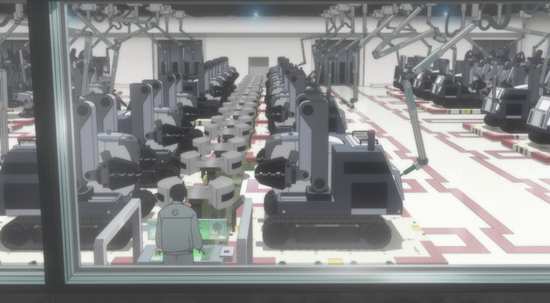Review for Psycho-Pass Season 1
Introduction
Think back to 2014. Funimation have just released Psycho-Pass in the US, and while the show may be getting deserved plaudits, Funimation’s discs are less applauded. They have locked subtitles, back when locked subtitles were still a comparative rarity, and worse, they’re blighted by the worst of anime Blu-ray afflictions, banding. People were competing to get the worst looking screenshots to share. So when Manga Entertainment announced that they were authoring their own release, people began to get excited, me included. After all, they promised four dual layer discs, and unlocked subtitles.
In the final analysis, all that extra disc space made not a jot of difference, as Manga used Funimation’s materials for the video on the disc, and inherited the banding issue regardless. And while the subtitles may have been unlocked, they suffered from Manga’s disc authoring, which prevented more than two captions on screen at any one time. That made a nightmare presentation when there was on screen text, or more than one conversation happening at a time. There were brief moments that were unwatchable. Manga’s scattershot approach to chaptering was the cherry on top. I’m a subtitle and original language fan. So for my second time around with Psycho Pass, I’ve imported the US release from Funimation.
It’s not exactly pre-crime, but the future of law enforcement in Japan is a logical outgrowth of the opinion that crime is committed by those who are psychologically capable of it. When it becomes possible to measure someone’s psychological state by technological means, it also becomes possible to pre-emptively stop crime from even happening by enforcing mandatory rehabilitation and psychological adjustment, or in the case of those too far gone, immediate removal from society by means of execution. So it is that every citizen has a Psycho-Pass, monitored by the SIBYL system, which assigns a set of colours to indicate a state of mind. You don’t want your Psycho-Pass to get cloudy!
That is the big problem for the crime investigators of the future. To investigate crime, you have to understand crime, understand the mindset of those who would commit crime, and that is a recipe for psychological disaster. Understanding the mindset of a serial killer won’t leave you with happy joy feelings. So the police service of the future is divided into two sections. The Enforcers are those who hunt down and deal with criminals and potential criminals, armed with powerful Dominator guns, which automatically scan a target’s psychological state, and are authorised to deliver disabling or lethal energy bolts by the SIBYL system. The Enforcers are those who are psychologically inclined to crime, who would be in permanent rehabilitation, locked away from society, if they didn’t accept the opportunity to serve as Enforcers. They’re the maniacs sent to catch the maniacs. They are overseen by the Inspectors, those who run the investigations, issue the orders, and keep a leash on the Enforcers to stop them going too far. They also have to do this without letting their own Psycho-Passes get too clouded.
Akane Tsunemori is top of her class, she could have had any career that she wanted, but for some reason she decided to devote her aptitude to law enforcement, starting work as a rookie Inspector. All the eagerness in the world to do good doesn’t prepare her for the reality of crime prevention, and the harsh penalties given out to people who merely refuse to act on their Psycho-Pass evaluations, let alone those with genuine criminal intent. Neither is she prepared for the quirky and unconventional Enforcers that she is expected to command, not least of which is Shinya Kogami, a man who’s trained himself to pull the trigger when the SIBYL system authorises, and not ask questions. Suddenly this new Inspector is asking questions. The thing is that Kogami used to be an Inspector himself, only he got too deeply into a serial killer investigation following the murder of an Enforcer under his command, and his Psycho-Pass flipped over the edge. And Akane hasn’t been on the force long, when the serial killings start again. But there is more to this than just a simple murder spree...
22 episodes of Psycho-Pass are presented across 4 Blu-ray discs from Funimation. You also get the show on DVD in this collection.
Disc 1
1. Crime Co-efficient
2. Those Capable
3. Rearing Conventions
4. Nobody Knows Your Mask
5. Nobody Knows Your Face
6. Return of the Psychotic Prince
7. Symbolism of Bletilla Striata
8. And Then, Silence
Disc 2
9. Paradise Fruit
10. Methuselah’s Game
11. Saint’s Supper
Disc 3
12. Devil’s Crossroad
13. Invitation from the Abyss
14. Sweet Poison
15. The Town Where Sulfur Falls
16. The Gate to Judgment
17. Iron Heart
18. A Promise Written on Water
19. Transparent Shadow
Disc 4
20. Where Justice Lies
21. Blood-Stained Reward
22. Perfect World
Picture
Psycho-Pass gets a 1.78:1 widescreen transfer at 1080p resolution. Psycho-Pass is blighted by digital banding. It’s everywhere. Any area of colour, usually the darker shades, will show visible gradation as the colour changes. It’s blocky, and obvious, and at its worst it looks like jpeg posterisation. It’s a crying shame as Psycho-Pass deserves better. Production I.G. bring their years of experience creating fantastic near future worlds in shows like Ghost in the Shell to bear on Psycho-Pass and the world design is fantastic. It’s rich in detail, vibrant, and the show is fluidly animated, blending 3D CGI and traditional 2D techniques flawlessly. The show uses a muted colour palette to enhance its realism, overlaying the action with a bright and hazy atmosphere. There is also a degree of realism to the backgrounds that makes the traditional anime characters stand out more, despite them again being designed a lot more realistically. Other than the banding, Psycho-Pass’s transfer is very good, smooth, sharp, and detailed.
Sound
You have the choice between Dolby TrueHD 5.1 Surround English and 2.0 Stereo Japanese. I was happy enough with the original language audio, the stereo bringing across the show’s music, action and dialogue with clarity, and enough space to make the action seem dynamic. Funimation give this show a very useful dub, with actors well suited to their characters, and bringing their game up to the level of the script, the quality of the show. The 5.1 remix also really suits the action in this show well. Psycho-Pass joins that rare group of anime titles I can watch in either language. This is the Funimation disc, so the translated subtitles and signs are locked to the appropriate audio track during playback, but the all important thing is that they aren’t borked. Everything that needs to be is translated as and when, and most of all, everything is legible and on screen at the right time and in the right places. Manga Entertainment have a habit of tweaking the translation when authoring locally (the odd usage of UK slang can crop up), but it’s been too long since my last watch of the show to recall any differences in the translation.
Extras
You get eight discs in a fatpack Blu-ray Amaray, four DVD and four Blu-ray, all held on four panels hinged in the middle of the case. You get an episode listing on the inner sleeve, and the whole thing is wrapped in an o-card sleeve.
Disc 1 autoplays with a trailer for Robotics;Notes.
Here you’ll find a commentary on episode 5 with Lydia Mackay (Shion), Lindsay Seidel (Yayoi), and Scott Freeman (Kagari).
Disc 2 autoplays a trailer for Blood-C the Movie.
You’ll find a commentary to go with episode 11 here, with voice actors Kate Oxley (Akane), Rob McCollum (Kogami), and Alex Organ (Makishima).
Psycho-Pass at Sakura Con Part 1 lasts 21:20 and is presented in HD. It catches up with directors Katsuyuki Motohiro, and Naoyoshi Shiotani, as well as producer Joji Wada as they do the junket thing at a US convention. There’s an extensive behind the scenes interview, footage of the panel that they held, and the odd soundbite from a passing cosplayer.
You get the textless credits, with locked subtitles.
You’ll also find Funimation Trailers for Steins;Gate, Jormungand, Appleseed XIII, Dragon Ball Z, Akira, The Future Diary, and The Anime Classics label.
Disc 3 autoplays with a trailer for Steins;Gate Part 2.
Episode 13 has a commentary with ADR director Zach Bolton, and actors Jason Douglas (Masaoka), and Josh Greele (Ginoza).
The commentary on episode 18 is with ADR Director Zach Bolton, and with him are Stephanie Young, voice of the Dominator, and Linda Leonard (Kasei).
Disc 4 autoplays with a trailer for the Eureka Seven Movie.
Psycho-Pass at Sakura Con Part 2 lasts 20:18 and with a brief behind the scenes look at the Psycho-Pass Party, it concludes the interview with the three creators.
Here you’ll find the second set of textless credits.
The US Trailer is also on this disc.
You’ll also find Funimation Trailers for Robotics;Notes, Jormungand, Appleseed XIII, Dragon Ball Z, Akira, The Future Diary, and The Anime Classics label.
Conclusion
There is considerable hype around Psycho-Pass which I have somehow managed to avoid to this point. It’s a cyberpunk fan favourite that has drawn favourable comparisons to Ghost in the Shell: Stand Alone Complex. Psycho Pass has spun off an Extended Version, a second season, and a feature film and while it isn’t quite at the same level of Ghost in the Shell’s brand awareness as yet, Psycho Pass has cemented itself as the modern cyberpunk anime of choice. The question is, is all this hype deserved?
The answer is a resounding yes. Psycho-Pass is the best science fiction anime series I have seen in years, with a compelling premise, engaging and flawed characters, and stunning action sequences, all executed with aplomb and assurance. Blasphemy of blasphemies, there were even some aspects of this show that I liked more than Ghost in the Shell. It also harks back to those anime shows of old that hadn’t yet been weighed down by fulfilling otaku expectations of cute and moe clichés, ticking things off a checklist to make sure all the tie-ins and merchandising will get sold, not that there aren’t tie-ins and merchandising associated with Psycho-Pass (I so want a Dominator of my own!), but this show never forgets the cardinal rule. The story-telling always comes first, and is never compromised. And that story calls for action, hard boiled violence, and gore that would suit the Manga of old. It’s the kind of anime show that I fell in love with, but added to that, it has something thoughtful to say about society through its science fiction premise, a premise that is seriously well thought out, not just paid lip service for the sake of epic visuals and futuristic techno-fan-service.
What I love about Psycho-Pass, indeed that aspect of it that trumps Ghost in the Shell for me, is that it takes a Philip K. Dick approach to its storytelling, no matter that the show actively references his works, while the creators cite him as an influence in the extras. What it does that I love, is that it takes modern society, introduces a sci-fi element, or just gives it a twist, and it looks at the consequences. In that respect, it becomes a show about people, about humanity, not just about the fancy technology, and that is when sci-fi works best. In Psycho-Pass, the premise is somewhat similar to Philip K. Dick’s Minority Report. That story had pre-crime, here it’s a technological means of evaluating a person’s propensity to commit criminal acts, and with the law enforcement services empowered, indeed required to act on a person’s psychological state, before a crime is even committed or conceived.
Just what kind of society would result? Psycho-Pass presents a world where the citizens are obsessed with minimising their Psycho-Pass rating, surround themselves with technical trappings to maintain their equilibrium, defer to technological imperatives when it comes to choosing their life paths, all to remain acceptable citizens of the state, in some extreme cases to the point of catatonia. So crime, when it happens is sudden and spontaneous, people who suddenly find themselves under stress, their Psycho-Pass spiralling out of control, past the point where optional therapy is possible, and to the point where the state will separate them from society by force. Those people have nothing left to lose.
Dealing with crime also becomes a problem, as the Inspectors who investigate the cases also have their Psycho-Passes to maintain. Too much violence, too much exposure to criminality risks them being labelled as latent criminals themselves, so they have the Enforcers as a buffer, those former Inspectors that have already crossed the line, as well as those potential criminals, society’s dropouts offered a chance to escape permanent technological exile and have some, monitored interaction with the world again. They do the grunt work of investigating; they deal with the criminals, so the Inspectors can remain psychologically pristine. It doesn’t always work.
All of this is overseen by a nation spanning computer AI and surveillance system, the SIBYL, which processes the psychological scans, and authorises the use of weapons by the Inspectors and Enforcers. The Dominator is a fantastic weapon, able to scan a person’s Psycho Pass, and being set to disabling or destructive force according to the psychological state of the target. The result is a society that isn’t too far removed from that of Demolition Man’s future world, all joy-joy feelings in a world where anything deemed bad for people is prohibited. Even artists have to be psychologically suited for their art, lest they wander into dangerous creative territory. And the Enforcers are the maniacs sent to capture the maniacs that spontaneously erupt from time to time.
And then you get that twist, that monkey wrench in this perfect world that drives the story. What if someone can fool the Psycho-Pass system? What if someone is different enough, psychologically, biologically to not register on the scanners? You get sociopaths now who can fool lie detector tests, in Psycho-Pass, it turns out that there are individuals who don’t register on the Psycho-Pass system, and some of them have criminal propensities. And all it takes is one megalomaniacal sociopath to threaten the whole system. In Psycho-Pass there is Makishima, who obviously didn’t react well to not being recognised as human as everyone else by SIBYL. On top of that, Makishima is smart, charismatic, and he’s figured out the flaw in the system, that the pre-emptive conformity imposed on society is eliminating free will, and sleepwalking the nation into the same sort of catatonia that affects the extreme adherents of the Psycho-Pass system. His solution to wake up society is bloody and extreme.
The story is utterly compelling, and Psycho-Pass is definitely one of those one-episode-more series. I also like that this isn’t one of those sci-fi shows that builds on an info dump at the start of the series, instead it unfolds its view of the future over the course of its episodes, and each new development revealed builds logically on what has come before. It helps that the characterisations are so well done. Makishima makes for a great villain, but among the detectives, the partnership between rookie Inspector Akane Tsunemori, and fallen Inspector Shinya Kogami is brilliant, the veteran detective guiding the new recruit, and her character arc is really well done. Then there is the head of the section, Ginoza, and another of the enforcers Masaoka, who have a particularly fractious relationship, which holds the attention.
Psycho-Pass is almost perfect. There are just a couple of niggles, the first being that this show was created as two seasons. You get a couple of standalone episodes before the main story arc kicks off, and it climbs to a narrative crescendo at episode 11. But then we get a couple more standalone episodes at the start of the ‘second season’ before resuming the main story, and in boxset form that’s a bit jarring. The second is that eventually the true nature of the SIBYL system that is running this utopian society is revealed, and it’s around here that I feared that the show was poised to jump the shark, delivering a sci-fi cliché that I’ve quite tired of at this point. It manages to pull back from that jump though, and delivers a great finale, but it’s still a precarious wobble that sticks in the mind.
This Funimation release of Psycho Pass may share that egregious digital banding with Manga’s release, but the chaptering of the episodes is logical, and most importantly for an original language and subtitle fan like me, the subtitles work without flaw. This is the version to get.




















































































Your Opinions and Comments
Be the first to post a comment!